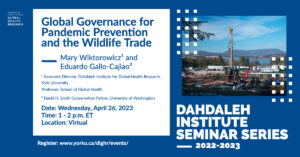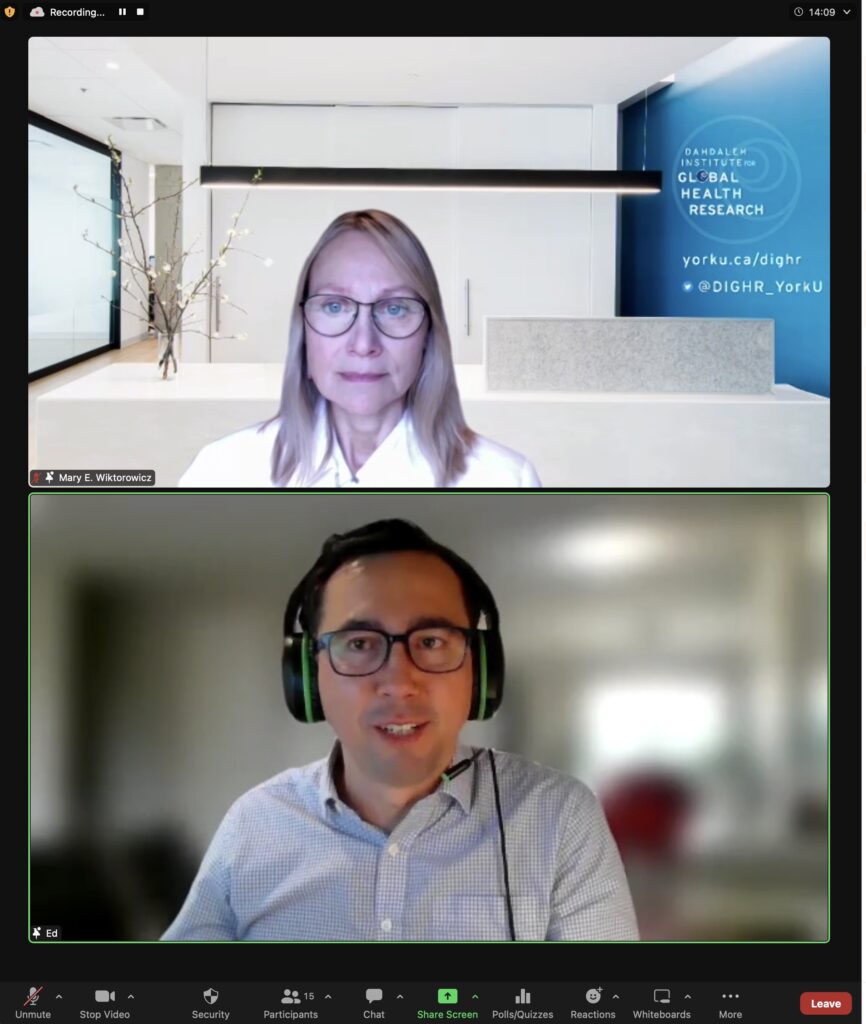Post
Published on May 10, 2023

In the final seminar of the 2022-2023 Dahdaleh Seminar Series, Eduardo Gallo-Cajiao and associate director Mary Wiktorowicz presented their recently published research on global governance for pandemic prevention and the wildlife trade.
Wildlife trade is a concern to public health and biodiversity conservation. However, a total ban on wildlife trade is neither feasible nor desirable, as many people depend on it for their livelihoods. As such, it is pivotal to consider conservation goals, trade, and livelihood objectives. The researchers posit that global health, food security, trade, and biodiversity conservation should be better coordinated as a strategy to prevent zoonotic spillover events. Further, as pandemic prevention often focuses more efforts on response after a zoonotic spillovers, rather than avoiding them in the first place, their research proposes to focus on prevention at source through governance macro-structures building on the Pandemic Treaty currently being negotiated under the World Health Organization.
Eduardo highlighted a few silo symptoms, which include lack of legally binding international agreements that prioritize both human health and biodiversity conservation. There are also governance gaps from institutions like CITES, OIE, and FAO, because they do not have a mandate to address zoonotic disease outbreak. Lastly, Eduardo mentioned the lack of cross-sectoral coordination between institutions, for example, WHO and CITES.
The Pandemic Treaty was proposed by Chile in April 2020. It has since garnered the support of 61 nations and moved into negotiations with the WHO. Accordingly, Eduardo and the research team propose four goals to include in the Pandemic Treaty. First, there is an imperative to improve risk understanding through the development of a policy-science platform, including the development of a framework for risk evaluation and monitoring. Second, such a framework should be adopted to evaluate zoonotic risk across the globe. Third, the assessment of zoonotic risk should be used to guide risk reduction accordingly. Fourth, a global pandemic financing facility should be established to support the previous three goals. The authors hope the WHO process will enshrine these goals in the Pandemic Treaty to prevent future pandemics by stopping zoonotic spillovers at their source.
Watch the seminar presentation below:
Connect with Mary Wiktorowicz
Themes | Global Health & Humanitarianism, Global Health Foresighting |
Status | Active |
Related Work |
N/A
|
Updates |
N/A
|
People |
You may also be interested in...
Spotlight: Global Health Intern Alum – Tiana Putric
Congratulations to Tiana Putric – a remarkable alum of the Dahdaleh Institute’s global health internship program! Tiana was a Dahdaleh Institute global health intern in the 2020-21 and 2021-22 academic years. While working with Jennie ...Read more about this Post
Highlighting the SWOT’s Risk-Based Approach at the 2022 Emergency Environmental Health Forum
Dahdaleh Institute member Michael DeSanti is presenting on the innovative Safe Water Optimization Tool (SWOT) at the 2022 Emergency Environmental Health Forum. He will discuss SWOT’s risk-based approach to generating chlorination guidance to ensure safe ...Read more about this Post
Recap – Earth Day Seminar Explores Self-Healing and Planetary Healing
On April 24, 2024, Dahdaleh senior fellow Dr. Harvey Skinner and community fellow Susan Harris dedicated a seminar in celebration of Earth Day. Susan initiated the gathering with a meditation session aimed at deepening participants' ...Read more about this Post



